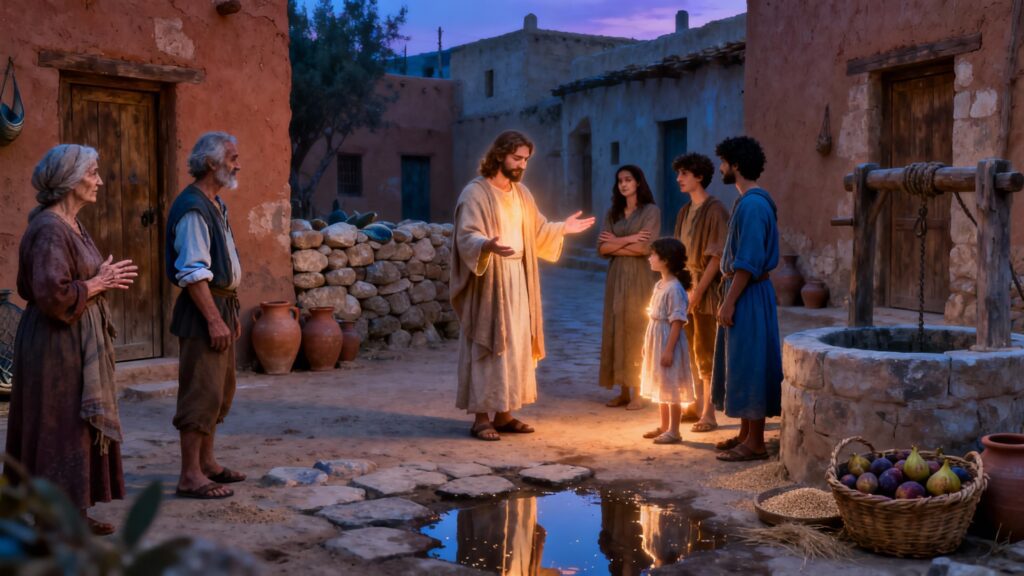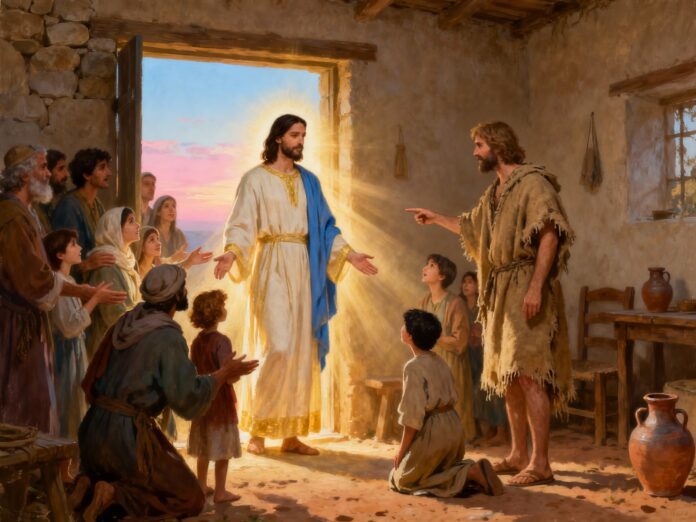Gospel of Jesus Christ according to Saint John
In the beginning was the Word,
and the Word was with God,
and the Word was God.
He was in the beginning with God.
It is through him that everything came into existence.,
and nothing that has been done has been done without him.
In him was life.,
and life was the light of men;
The light shines in the darkness.,
And the darkness did not stop her.
The Word was the true Light,
that enlightens every man
by coming into the world.
He was in the world,
and the world came into existence through him,
But the world did not recognize it.
He came to his house,
and his own people did not receive it.
But to all those who received it,
He gave the power to become children of God.,
those who believe in his name.
They were not born of blood,
nor of a carnal will,
nor from a man's will:
They are born of God.
And the Word became flesh,
He lived among us,
and we have seen his glory,
the glory he receives from his Father
as an only son,
full of grace and truth.
– Let us acclaim the Word of God.
To enter into the flesh of the Word in order to dwell in the light
How the Incarnation renews our view of God, the world, and our own humanity.
The Prologue to the Gospel of John, a pinnacle of theological poetry, encapsulates the entire Christian mystery: God makes himself visible, accessible, and habitable. This article is for any reader, believer or seeker of meaning, who desires to understand how this Word made flesh reorients daily life. What does it mean today to "dwell" in this light, and how does this mystery speak to our flesh, our relationships, and our civilization?
- Context and power of the Johannine text
- The Word as the origin and light of creation
- The main themes of the Incarnation: revelation, relationship, transformation
- Practical applications: family, work, society, prayer
- Biblical and traditional resonances
- Meditation track and contemporary challenges
- Prayer to inhabit the Word and practical conclusion
Context
The opening of the Gospel according to Saint John (Jn 1:1-18) acts as a threshold. It does not primarily recount the historical birth of Christ; rather, it presents the cosmic event of the Incarnation: the eternal Word of God enters into time. This text, often proclaimed at Christmas or at Mass on the Octave of the Mass, immerses the reader in a reality that transcends reason but touches the heart: He who is before all things makes himself visible in human frailty.
This passage, deeply rooted in the Jewish tradition of the creative Word (as in Genesis: «God spoke, and it was so»), addresses a Greek world enamored of Logos—reason, structure, the wisdom of reality. John achieves the synthesis: the Greek Logos becomes Jewish flesh. The invisible God allows himself to be touched, heard, encountered. The verb skenoun—"to pitch one's tent"—translates "to dwell among us"; it evokes the Shekinah, the divine presence in the desert.
The text is structured in a spiral: it begins with the pre-existence of the Word, descends into the world, journeys through the acceptance or rejection of humanity, and then rises again in the grace and truth embodied in Jesus Christ. This cosmic dynamism offers each reader a spiritual path: to welcome the light, to receive life, to become a child of God.
Thus, the Prologue is not an abstract introduction. It sets the tone and provides the key to the entire Johannine work: contemplation, revelation, communion. It invites each person to perceive Christ not only as Savior, but as the very principle of life.
Analysis
The expression, «The Word became flesh and dwelt among us,» encapsulates three key elements: divine origin, the human condition, and true communion. John affirms that God no longer merely speaks; he becomes his own lived Word. Where all religions separate the sacred from the profane, heaven from earth, this text unites the two.
Johannine theology unfolds around a logic of gift: the Word gives existence, light, and divine filiation. Humanity receives, often refuses, sometimes consents. This dynamic of the gift revealed in the "flesh" opens a revolution. The flesh is no longer simply a weakness: it becomes a place of manifestation. Matter, history, even suffering can become the face of God.
The Church Fathers—Irenaeus, Athanasius, Augustine—read in it the promise of the divinization of humankind. «God became man so that man might become God,» said Athanasius. The Incarnate Word aims not only to forgive us, but to recreate us. Through it, human existence finds direction: toward the truth that liberates and the grace that transforms.
The creative Word and the light of the world
In the Prologue, the first statement, «In the beginning was the Word,» resonates like a re-creation of Genesis. Through this Word, God brings the universe into being. This «beginning» does not refer to a moment in the past, but to the enduring principle of all being. In it, creation remains alive.
Furthermore, light is not a vague metaphor. It illuminates "everyone coming into the world." In other words, God never ceases to act in every conscience. Recognizing this light becomes an act of faith. In a world saturated with artificial images, John reminds us that true clarity comes from an inner presence capable of guiding chaos.
The Word, creative light, does not extinguish darkness but opposes it with its vitality. The text specifies: «the darkness did not grasp it.» This Greek verb, katalambanein, can mean «to grasp in order to extinguish» or «to grasp in order to understand.» Darkness fails in both directions: it can neither stifle nor comprehend the light.
Thus, each believer is invited to become a witness to this light by taking up the mission of John the Baptist: "He came to bear witness." Personal witness becomes the contemporary way of inhabiting the light.
His own people did not receive him – the tragedy of the reception
The mystery of human freedom arises: God presents himself, but humanity can refuse. «He came to his own, and his own people did not receive him.» John depicts here God’s apparent failure; yet, this refusal opens a space for grace. Faith is not automatic; it comes through free consent.
The modern world reflects this tension: we celebrate Christmas without always recognizing the One who is coming. We consume the festivities but flee from the encounter. Yet, to those who "receive him," the text promises the greatest of gifts: to become children of God.
This lineage transcends all genetic or cultural affiliation: "neither of blood nor of the will of man; they were born of God." The Word engenders a new humanity, no longer born of biological flesh but of the creative Spirit.
Welcoming the Word thus implies a transformation of perspective: welcoming the other, the different, the stranger into our very being is already welcoming God. Tenderness becomes a theological space.
Grace and Truth: A New Law
John contrasts the Law given by Moses with the "grace and truth" that came through Jesus Christ. This is not an opposition of abolition, but of fulfillment. The Law taught the divine will; grace makes it possible. Truth, in the Johannine sense, is not an abstract idea: it signifies God's active faithfulness to his promise.
This transformation of the relationship between God and humanity overturns the entire religious economy: no more bloody sacrificial mediation, but direct communion in the Son. «No one has ever seen God; the only begotten Son, who is in the bosom of the Father, has made him known.» The heart of Christian revelation becomes relationship.
Christ does not merely transmit a teaching; he communicates his own life. His humanity becomes divine transparency: to see Jesus is to see the Father.
This truth-grace is embodied in ordinary life in various forms: marital fidelity, offered forgiveness, commitment to greater justice, patient self-acceptance. Every time a person chooses the truth of the heart over the strategy of power, they allow the Word to continue its work of recreation.

Concrete implications
In family lifeThe Incarnation invites us to sanctify the everyday. To welcome the other in their fragility is to recognize in them a part of the Word. Education becomes the transmission of light, not mere performance.
In professional lifeWork takes on a theological meaning: it participates in the creative work. To work in truth, to refuse corruption, to enter into the logic of giving rather than absolute profit, is to give flesh to the Word.
In societyThe Incarnation humanizes social relations. It establishes the inalienable dignity of every life, from the first cry to the last breath. Thus, all genuinely humane politics must be measured against this light.
In spiritual lifePrayer becomes a dwelling place. God does not speak from above; he speaks "within". Entering into the flesh of the Word is learning to breathe in rhythm with it: silence, listening, concrete acts of love.
Traditional resonances
The Church Fathers commented extensively on this Prologue:
- Irenaeus of Lyons saw in the Word made flesh the recapitulation of all human history.
- Athanasius, in the 4th century, forged the theology of divinization.
- Augustine derived from this the philosophy of inner speech.
- Thomas Aquinas read in the expression "full of grace and truth" the fullness of divine virtues offered to man.
The Christmas liturgy resonates with these echoes: light has shone upon the earth. In the Eastern tradition, the icon of the Nativity shows the dark cave transfigured: the inner light illuminates the universe. In the Western tradition, the Incarnate Word opens the path of reason illuminated by faith.
The Prologue thus becomes a bridge: between philosophy and mysticism, between Hebraism and Hellenism, between heaven and earth.
Meditation track
- Read John 1:1-18 slowly.
- Each time the word "light" comes up again, stop and breathe.
- Imagine this light penetrating your day: at work, at home, in the eyes of a loved one.
- Name a personal darkness internally — fear, guilt, fatigue — and then bring it back into the light.
- End with a simple act: write a kind word, offer a concrete service, call someone you've forgotten.
Faith then becomes a daily muscle: not an idea, but an embodiment.
Current issues
How can we "dwell among" others in a digital world where we pass each other without truly meeting? The Incarnation reminds us of the urgency of real contact. Screens illuminate, but they do not warm. Christ did not send a message; he came himself.
The second challenge: what to do with our wounded flesh? The Christian faith does not idealize: it accepts. The suffering, aging body remains sacred. The Incarnation forbids the contempt of the body as an instrument; it makes it the sanctuary of God.
Finally, truth and grace are threatened by the fragmentation of certainties. To bear witness to the Word today is to speak truthfully, without aggression, with clarity and gentleness.
Prayer
Lord, Eternal Word,
You who were before time and who came to pitch your tent among men,
come and live in our time.
When our darkness leads us astray, light our way.
When our flesh closes, open it to your breath.
Let us hear your voice above the clamor of the world,
and may your light illuminate our relationships, our choices, our labors.
Grant that we may become, by your grace, a light for one another.
May your gentle truth permeate our words.,
and may your transfigured flesh inspire our tenderness.
We entrust to you our families, our countries, our secret wounds:
come and dwell in us as on the first morning of the world.
Amen.
Conclusion
The mystery of the Word made flesh is not a closed event; it unfolds in every moment embraced. God continues to be born where a heart opens. To dwell in this presence is to reject the separation between the spiritual and the material, between faith and action. Every act of faithfulness, every word of truth, writes a new verse in the Prologue.
Practical
- Read John 1:1-18 every day for twelve days, one sentence at a time.
- Keep a journal of the "insights received" during the week.
- To practice a work of corporal or spiritual mercy.
- Entering an empty church for a moment of luminous silence.
- Say each morning: "Lord, come and dwell in my day."«
- To offer a loved one a word that restores their face.
- To reread one's humanity not as a weakness, but as a place of encounter.
References
- Gospel according to Saint John, chapter 1, verses 1-18.
- Saint Irenaeus, Against heresies, III, 18.
- Saint Athanasius, On the Incarnation of the Word.
- Saint Augustine, Tractatus in Iohannis EvangeliumI-V.
- Thomas Aquinas, Summa Theologica, IIIa, q. 1-4.
- Benedict XVI, Jesus of Nazareth, vol. 1, prologue.
- Roman liturgy of the Christmas Day Mass.


